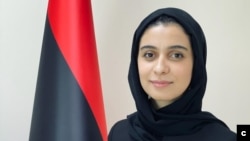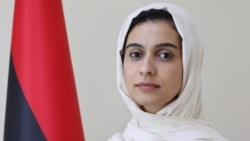WASHINGTON — The interview was edited for brevity and clarity.
VOA: Can you describe the current state of press freedom in Libya and how it has been affected by the conflict?
Wheba: Press freedom in Libya cannot be separated from the whole political and economic situation: unless there is political stability, freedom of the press will be threatened. It's like a mirror. It takes a certain level of political stability to have improvement in levels of press freedom.
VOA: The 21st edition of the annual press freedom index released earlier this week by Reporters Without Borders noted that Media and journalists in Libya are "commonly forced into the service of one of the parties involved in the conflict, to the detriment of editorial independence." What do you make of this?
Wheba: I didn't receive any documented information or a complaint in this regard, but if there is any case of journalists who were forced to work without their desire, then it is a violation of local and international laws and those who were forced to do so must resort to courts and stop such abuses.
Journalists in Libya are working under great pressure. The uncertainty and the lack of stability politically and economically are negatively affecting levels of the freedoms [enjoyed by the] press - and, actually. all kinds of freedom. There are some steps that could be taken and would be very helpful to journalists and society in general [such as] having a code of conduct signed and committed to by all major TV channels, radio stations, platforms [and] newspapers. This would be very helpful and important to all parties, and also having a syndicate for all Libyan journalists from all cities, and all parts of the country. This would unify the voices of journalists and strengthen their work.
VOA: What role can journalism play in promoting peace and stability in Libya?
Wheba: Journalists can do a lot. They have a huge role to play. I can simply say when journalists are committed to the ethics of journalism, when they are committed to avoiding and fighting hate speech, when they use technology to fight disinformation and fake news, [and] when they do not allow anyone to exploit or use their precious voices and words as tool to incite or to harm - all this contributes to peace and stability.
VOA: Can you share any personal experiences or challenges you have faced as a former journalist in Libya?
Wheba: The first challenge that comes to my mind during my current job or previously is how to maintain the highest level of professionalism and objectivity and how not to allow anyone to exploit or use my voice and my words during political polarization. Also to be always aware of my self-censorship.
I remember when I was a journalist, I used to think that asking questions is the most important and the most difficult part. Today I know that providing answers objectively - without being influenced by my biases - is also not an easy part.
VOA: The world just marked Press Freedom Day. On this occasion, what message would you like to send to the international community regarding the challenges that journalists face in reporting on the ongoing conflict in your country?
Wheba: International community is a broad expression. It includes many countries and many institutions. If we are talking, for example, about the United Nations, there are many Security Council resolutions in favor of journalists and protecting them. But [among] the five countries, the permanent members of the U.N. Security Council - [they] do not share the same vision about freedom of the press.
And it's well known that even levels of freedom of the press in those five countries are not the same. They are way different. So we can't rely on them as a reference.
What matters for Libyan journalists is to rely on solid local legislation and laws before relying on the international community.






